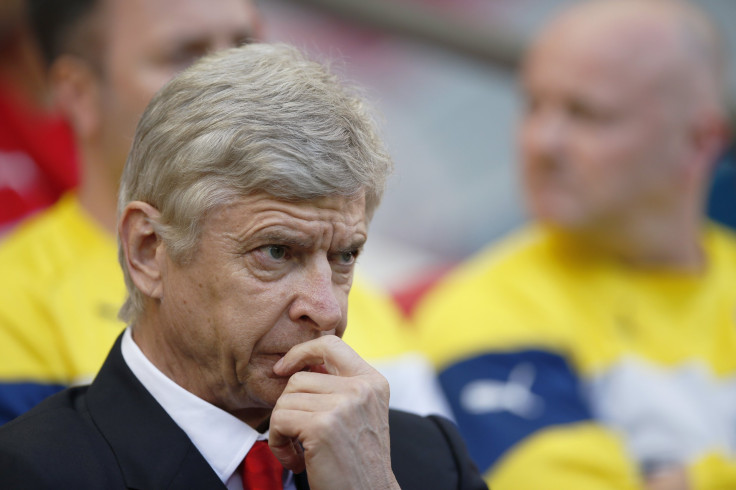Arsenal News: Will Arsène Wenger Lead The Gunners To Another Premier League Title?

Sunday’s goalless draw at home to Chelsea effectively condemned Arsenal to a 11th consecutive season without a Premier League title and again brought Arsène Wenger’s continued guidance of the club into the spotlight. Next season will be his 20th in charge of the London giants, but after regularly winning and competing for the biggest trophies in his early years, they haven’t come close in recent seasons.
Stepping away from the bigger picture, recent weeks have provided reason for greater optimism than has been witnessed at the Emirates Stadium for some time. Arsenal are still on course to claim second place in the Premier League, which would be their highest finishing position in a decade. At the same time they have an FA Cup final to look forward to and the chance to retain the trophy while becoming the most successful club in the history of the world’s oldest domestic cup competition.
Before failing to break down Chelsea on Sunday, Arsenal had won eight successive Premier League matches, their best run since their last title-winning season in 2003-2004, when they went through the entire campaign unbeaten. A large contributor to that has been the club’s policy shift in the transfer market the last two summers, targeting established stars as well as emerging talent, paying dividends. Mesut Özil and, to a greater extent, Alexis Sanchez, have added a decisive quality in attacking areas that Arsenal lacked for several seasons following the departure of the likes of Thierry Henry, Robert Pires and Freddie Ljungberg.
On the surface, at least, Arsenal are not that far away from being a real challenger. As well as the improvement going forward, the team’s recent defensive weakness has been diminished. Francis Coquelin came in from the cold to add some much-needed security in front of the back four, while Per Mertesacker and Laurent Koscielny have been largely solid upon resuming their complementary partnership.
And yet there is an argument that fundamentally the team has not moved forward. In practice there is little difference between finishing second and fourth in the Premier League, especially as Arsenal have never truly been in the title race. Possessing the stability lacked by some of their rivals and now the finances to compete with them, Champions League qualification no longer counts as the success it did during the financially constrained years following the move to the Emirates.
And, of course, it is just last month that Arsenal were condemned to a fifth consecutive failure to get beyond the last 16 of the Champions League. The manner of defeat this time around was particularly galling. Given the kindest draw they could have hoped for in the opening knockout round, Arsenal shot themselves in the foot calamitously in the first leg at home to Monaco, displaying all the failures that have blighted the team in recent seasons.
There were the mental deficiencies, with the club unable to perform under the weight of the pressure and expectations. And the tactical side was also again lacking, as Arsenal recklessly chased forward leaving gaps at the back. Questions were also raised about whether some of the team is up to the standard required for what Arsenal’s ambitions should now be. In particular, striker Olivier Giroud missed chances, while Mertesacker floundered at the back.
The same struggles to perform in the big games were evident as Arsenal’s Premier League title challenge collapsed last season, as well in their last three visits to Wembley against much inferior opposition in the FA Cup. As good as this recent run has been, it has been achieved with the pressure largely off.
When asked to evaluate Arsenal’s performance, Wenger repeatedly states that it is up to others to do the judging. However, there now has to be a mentality at the Emirates that qualifying for the Champions League and even winning domestic cups isn’t enough. Clubs of Arsenal’s stature are defined by their ability to truly compete for their domestic title and the Champions League. Until that happens, doubts must remain about whether Wenger is still capable in a sport that has moved on considerably since he last did so. It has become a regular occurrence for there to be reason for optimism heading into the summer, the sense that next season will be the one, only for the same mistakes to cost Arsenal the following campaign.
The issue of Wenger’s merits has come up, too, because of the sudden availability of one of the world’s current leading managers. Jürgen Klopp has often previously been written about as a possible successor to Wenger, and it would surely be negligent of Arsenal’s board not to consider the possibility now after his announcement that he will be leaving Borussia Dortmund. Realistically, though, having last year signed a contract that runs until 2017, Wenger will not be asked to step aside by a club he helped transform on and off the pitch.
While the arrival of someone like Klopp may be needed to push Arsenal over the line, there is security with Wenger in charge, knowing that he is almost guaranteed to lead them to the money-spinning Champions League every season. Owner Stan Kroenke and others at the club will doubtless have taken heed of what happened when the only manager comparable in terms of influence and length of tenure to Wenger, Sir Alex Ferguson, stepped away from Manchester United. Removing Wenger wouldn’t simply be a case of replacing a coach, but replacing a man who is responsible for essentially guiding the whole ethos of the club.
As Manchester United found to their cost, doing so leaves plenty of opportunity for errors and for the club to go into freefall, at least temporarily. With that in mind, Arsenal are likely to remain entrusted to Wenger’s safe pair of hands.
© Copyright IBTimes 2025. All rights reserved.





















